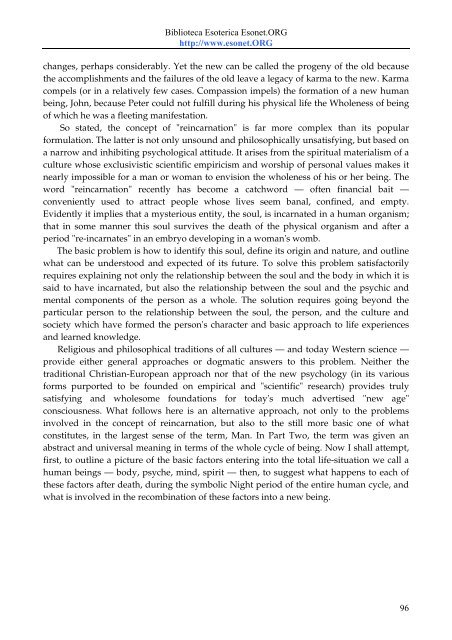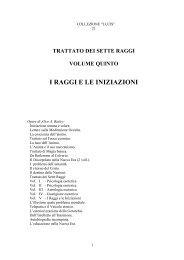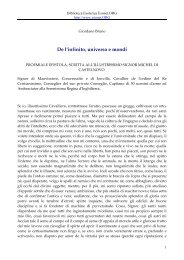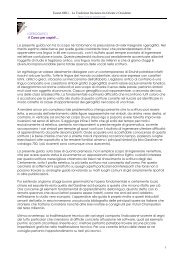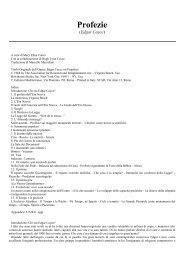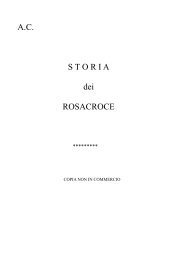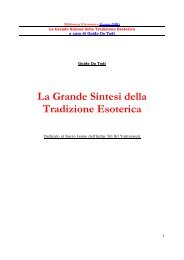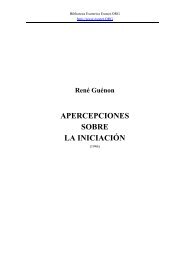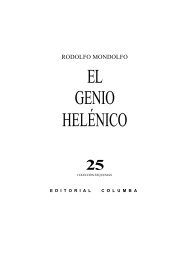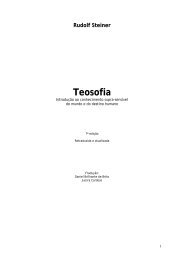Biblioteca Esoterica Esonet.ORG http://www.esonet.ORG 1
Biblioteca Esoterica Esonet.ORG http://www.esonet.ORG 1
Biblioteca Esoterica Esonet.ORG http://www.esonet.ORG 1
You also want an ePaper? Increase the reach of your titles
YUMPU automatically turns print PDFs into web optimized ePapers that Google loves.
<strong>Biblioteca</strong> <strong>Esoterica</strong> <strong>Esonet</strong>.<strong>ORG</strong><br />
<strong>http</strong>://<strong>www</strong>.<strong>esonet</strong>.<strong>ORG</strong><br />
changes, perhaps considerably. Yet the new can be called the progeny of the old because<br />
the accomplishments and the failures of the old leave a legacy of karma to the new. Karma<br />
compels (or in a relatively few cases. Compassion impels) the formation of a new human<br />
being, John, because Peter could not fulfill during his physical life the Wholeness of being<br />
of which he was a fleeting manifestation.<br />
So stated, the concept of "reincarnation" is far more complex than its popular<br />
formulation. The latter is not only unsound and philosophically unsatisfying, but based on<br />
a narrow and inhibiting psychological attitude. It arises from the spiritual materialism of a<br />
culture whose exclusivistic scientific empiricism and worship of personal values makes it<br />
nearly impossible for a man or woman to envision the wholeness of his or her being. The<br />
word "reincarnation" recently has become a catchword — often financial bait —<br />
conveniently used to attract people whose lives seem banal, confined, and empty.<br />
Evidently it implies that a mysterious entity, the soul, is incarnated in a human organism;<br />
that in some manner this soul survives the death of the physical organism and after a<br />
period "re-incarnates" in an embryo developing in a woman's womb.<br />
The basic problem is how to identify this soul, define its origin and nature, and outline<br />
what can be understood and expected of its future. To solve this problem satisfactorily<br />
requires explaining not only the relationship between the soul and the body in which it is<br />
said to have incarnated, but also the relationship between the soul and the psychic and<br />
mental components of the person as a whole. The solution requires going beyond the<br />
particular person to the relationship between the soul, the person, and the culture and<br />
society which have formed the person's character and basic approach to life experiences<br />
and learned knowledge.<br />
Religious and philosophical traditions of all cultures — and today Western science —<br />
provide either general approaches or dogmatic answers to this problem. Neither the<br />
traditional Christian-European approach nor that of the new psychology (in its various<br />
forms purported to be founded on empirical and "scientific" research) provides truly<br />
satisfying and wholesome foundations for today's much advertised "new age"<br />
consciousness. What follows here is an alternative approach, not only to the problems<br />
involved in the concept of reincarnation, but also to the still more basic one of what<br />
constitutes, in the largest sense of the term, Man. In Part Two, the term was given an<br />
abstract and universal meaning in terms of the whole cycle of being. Now I shall attempt,<br />
first, to outline a picture of the basic factors entering into the total life-situation we call a<br />
human beings — body, psyche, mind, spirit — then, to suggest what happens to each of<br />
these factors after death, during the symbolic Night period of the entire human cycle, and<br />
what is involved in the recombination of these factors into a new being.<br />
96


